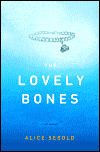The Kite Runner
Note: This blog should be back to its orignal place by next week, in 7 days time, if everything progresses smoothly.
 When I read The Kite Runner, I cried. Then again, which book do I read that I don't cry? It's touching, but what struck me was that I was reminded of Toni Morrison's The Bluest Eye. Bluest Eye runs the story around the rape, but The Kite Runner doesn't. Both include that though. Is it confusing?
When I read The Kite Runner, I cried. Then again, which book do I read that I don't cry? It's touching, but what struck me was that I was reminded of Toni Morrison's The Bluest Eye. Bluest Eye runs the story around the rape, but The Kite Runner doesn't. Both include that though. Is it confusing?At the beginning of The Kite Runner when I read how the main character abandoned his friend/brother/servant, I hated him. At that time I thought that the main character is the author so I flipped to the first page of the book, looked at the picture of the author and transferred my hate to the picture. I wondered why am I reading this book. Why should a man who had committed such a terrible thing in his childhood be allowed to possess such great writing talent? Not to mention getting a book published and recognized internationally. Later on I realized that they are 2 different persons, and that the main character is really fiction.
Kite Runner is very unlike other books. In other books, I liked the main characters, pitied them, sympathised with them. This one is a first. It made me hate him.
The atrocities that the Talibans commit in Afghanistan, the stoning, raping, conditions of living as described in the book were so detailed that I was horrified and disgusted. It was beyond what I read in newspapers. It was as if I was there myself, a little part of me. I can't imagine how life is like there, to be living in fear everyday, living with the possibility of getting blown up any moment. I was frowning, gasping and making weird noises (including "eek!, eeee..., umph," as well as voices at the back of my throat) while reading the book, so much so that my mom told me to stop it. Suddenly I appreciate living here in Singapore. Like Afghanistan, we have restrictions too. But unlike Afghanistan, our restrictions come with peace and I am glad. I don't have to walk around with the fear of getting bombed or worry about where my food is coming from. I'm glad that when I'm outside, the thoughts in my mind revolve around getting to my destination on time, stress on minor things such as not being able to play well during concert, stage-fright and studies. I'm just plain glad.
A section at the back of the book took my attention:
In Afghanistan, the ending was all that mattered. When Hassan and I came home after watching a Hindi film at Cinema Zainab, what Aliv, Rahim Khan, Baba, or the myriad of Baba's friends - second and third cousins milling in and out of the house - wanted to know was this: Did the Girl in the film find happiness? Did the bacheh film, the Guy in the film, become kamyab and fulfill his dreams, or was he nah-kam, doomed to wallow in failure?Yes, life goes on, unmindful of beginning, end, kamyab, nah-kam, crisis or catharsis, moving forward like a slow, dusty caravan of kochis.
Was there happiness at the end, they wanted to know.
If someone were to ask me today whether the story of Hassan, Sohrab and me ends with happiness, I wouldn't know what to say.
Does anybody's?
After all, life is not a Hindi movie. Zendagi migzara, Afghans like to say: Life goes on, unmindful of beginning, end, kamyab, nah-kam, crisis or catharsis, moving forward like a slow, dusty caravan of kochis.
I wouldn't know how to answer that question.





0 Comments:
Post a Comment
<< Home